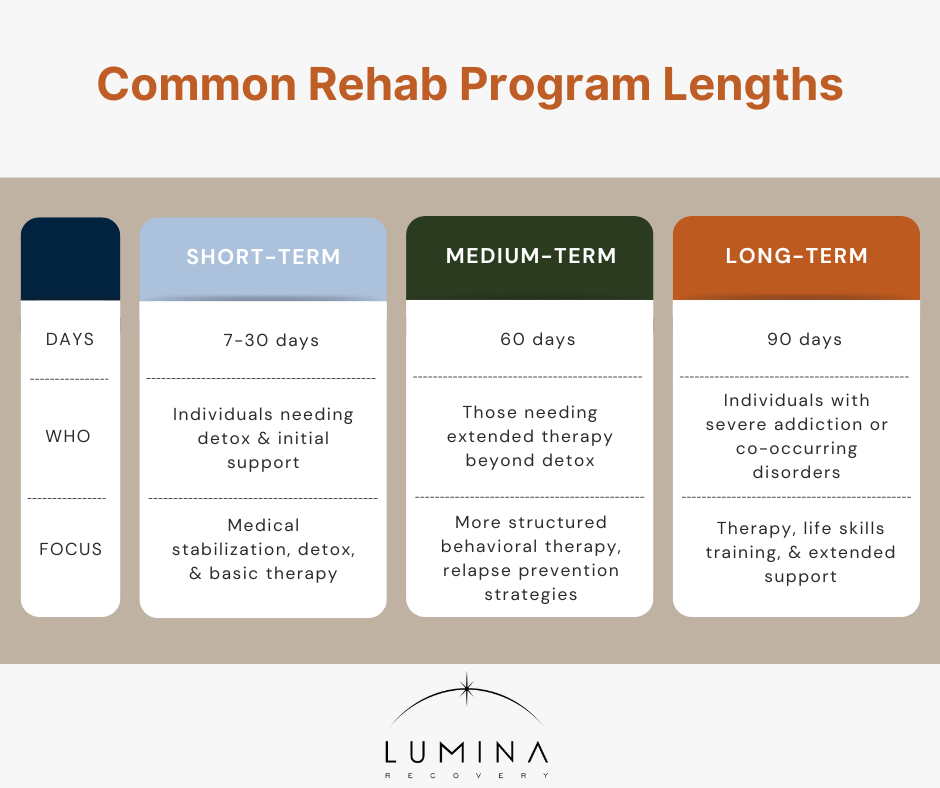The length of rehab varies based on factors such as the severity of addiction, the substance involved, and the individual’s progress. Most programs last anywhere from a week to 90 days and fall into one of two categories: inpatient or outpatient addiction treatment.
While some people benefit from shorter stays, others require long-term drug rehabilitation for lasting recovery. Understanding how long drug rehab takes is crucial in selecting the right program.
Rehab Treatment Durations
Rehab programs provide structured support to help individuals recover from addiction. The duration of a program depends on the level of care required and the type of program chosen.
There are two main types of rehab:
- Inpatient rehab, also called residential treatment, is an option that requires individuals to stay at a facility full-time and typically lasts 30 to 90+ days. Detox, which usually lasts 7 to 14 days, is often the first step before transitioning into a residential rehab program.
- Outpatient rehab allows individuals to receive treatment while living at home, offering flexibility for those with work or family commitments. These programs often last between 60 and 90 days. Examples include intensive outpatient programs (IOP), partial hospitalization programs (PHP), telehealth, and standard outpatient therapy.
Common Rehab Program Lengths
How long is rehab? Rehab programs are categorized as short-term, medium-term, and long-term addiction treatment.
Short-Term Programs (7-30 Days)
A short-term rehab program focuses on detox and initial recovery support. These programs work well for individuals with mild addiction, providing a structured environment for beginning recovery.
However, relapse risk may be higher due to the limited time for behavioral therapy. Individuals who choose a short-term program often transition into outpatient care to continue their recovery journey.
Medium-Term Programs (60 Days)
A 60-day rehab program offers more time to focus on behavioral therapy, relapse prevention skills, and deeper healing. It balances accessibility and comprehensive treatment, making it a solid choice for individuals with moderate addiction.
This extra time allows individuals to develop coping skills and work through underlying issues that may have contributed to substance abuse.
Long-Term Programs (90 Days)
Long-term drug rehabilitation provides the most comprehensive approach to recovery. These programs offer structured therapy, medical support, and relapse prevention planning to promote lasting recovery.
Individuals in long-term programs often work through multiple phases of treatment, transitioning from intensive inpatient care to outpatient programs for continued support.
What Determines the Length of Rehab?
Several factors affect how long a substance abuse program takes:
- Severity of addiction. Individuals with severe substance use disorder often require longer treatment.
- Type of substance used. Different substances, such as alcohol or opioids, have varying withdrawal timelines, affecting the required rehab duration.
- Co-occurring disorders. Mental health conditions may require additional treatment time to address underlying psychological factors contributing to addiction.
- Individual progress. Personalized treatment plans adjust based on the individual’s recovery progress. Some individuals may need extra time to fully engage in therapy and develop lasting coping skills.
- Support system & environment. A strong support system can influence rehab duration and long-term success. Individuals without a stable home environment may benefit from extended care in a residential setting.
The Importance of Personalized Treatment Plans
Recovery is not one-size-fits-all. Rehab facilities tailor programs based on:
- The individual’s history with addiction
- Co-occurring mental health conditions
- Medical and psychological needs
- Personal recovery goals
A personalized treatment plan ensures that each person receives care suited to their unique needs. Treatment professionals assess individuals and adjust their program length as needed.
The length of rehab an individual undergoes is crucial to ensuring long-term success. Ongoing evaluations help determine when a person is ready to transition to a less intensive level of care.
Additionally, therapy approaches differ based on individual needs. Cognitive behavioral therapy (CBT), dialectical behavior therapy (DBT), group therapy, and family counseling all contribute to recovery and impact treatment duration. Having a plan that incorporates these elements significantly increases the chances of sustained sobriety.
How to Choose the Right Rehab Duration for You
Deciding how to choose the right rehab program and length requires careful consideration of personal circumstances. Some key factors include:
- Severity of addiction. Longer programs are recommended for individuals with a long history of substance use.
- Mental health considerations. Co-occurring disorders often require a more extended treatment period.
- Support system. A strong support network at home may allow for a shorter inpatient stay followed by outpatient care.
- Relapse history. Those with previous relapses may benefit from long-term addiction treatment to develop stronger coping mechanisms.
Consulting with Treatment Professionals
Speaking with a rehab specialist is essential to determining the appropriate program length. Professionals conduct assessments to evaluate addiction severity, mental health conditions, and personal goals to recommend an effective treatment plan.
FAQs
How long does rehab typically last?
Rehab programs vary in length, commonly offering 30-day, 60-day, and 90-day options. The appropriate duration depends on individual needs and the severity of the addiction.
How long is inpatient rehab?
Inpatient rehab typically lasts between 30 and 90 days, with some long-term programs extending beyond 90 days for individuals requiring more comprehensive treatment.
How long does a substance abuse program take?
The length of a substance abuse program depends on individual progress, the severity of addiction, and whether outpatient or inpatient treatment is chosen.
How long do people stay in rehab?
Most people stay in rehab for at least 30 days, but longer stays—such as 60 or 90 days—can increase the chances of long-term recovery.
How long is alcohol rehabilitation?
Alcohol rehab durations vary based on addiction severity. Standard programs last between 30 and 90 days, though some individuals may need longer treatment.
Find the Right Treatment Length with Lumina Recovery
Choosing the right rehab duration is critical for long-term recovery success. At Lumina Recovery, we offer personalized inpatient and outpatient programs to meet each individual’s needs. Our dual diagnosis treatment ensures that those with co-occurring mental health conditions receive comprehensive care.
If you’re wondering, “How long does rehab last?” our expert team can help guide you to the right program. Contact us today to start your recovery journey.




